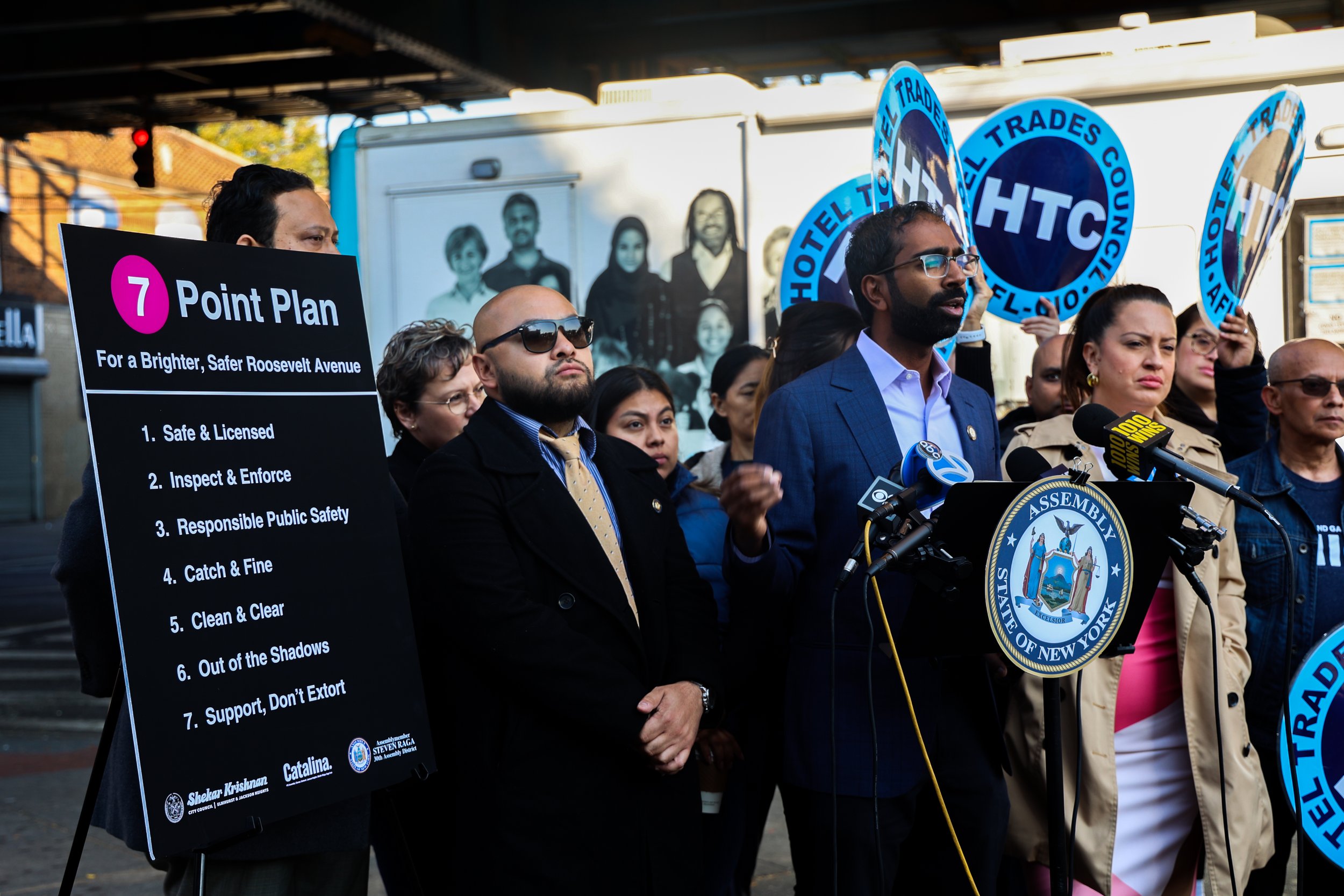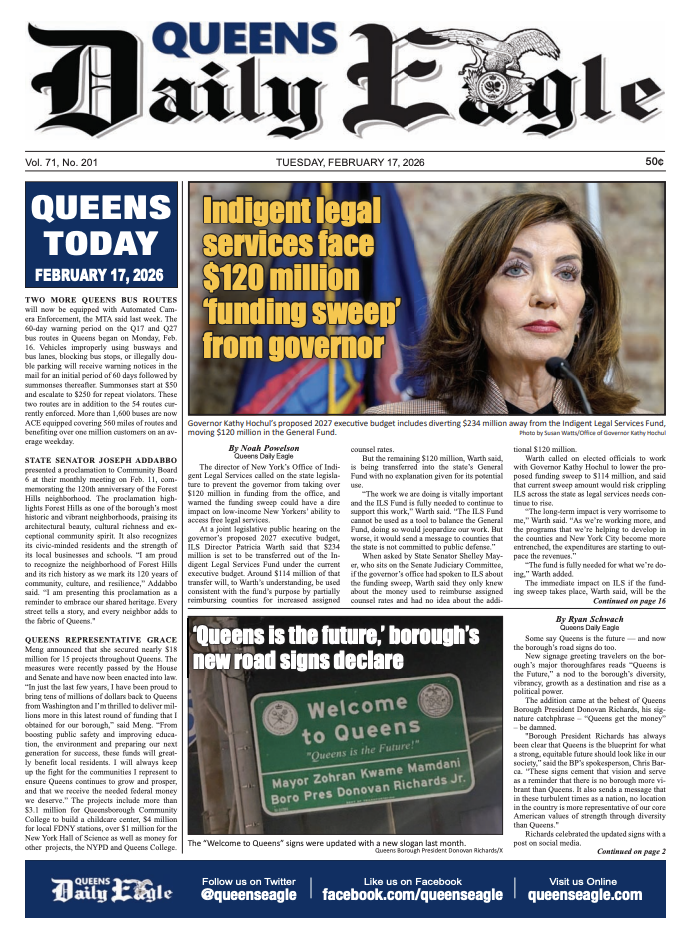Many problems, many solutions: Local pols pitch new plan to fix Roosevelt Ave after mayor, gov launch their own efforts
/Queens officials, including (L to R) Assemblymember Steven Raga, Councilmember Shekar Krishnan and Assemblymember Catalina Cruz, laid out their own plan on Wednesday for how to address issues on Roosevelt Avenue. Eagle photo by Ryan Schwach
By Ryan Schwach
Everyone agrees that Roosevelt Avenue has issues. But no one appears to agree on how to solve them.
On Wednesday, a trio of local elected officials pitched a seven-point plan for improving life on the iconic Queens strip, which in recent years has seen an increase in sex trafficking, illegal vending and dirty conditions. Their plan centered around increasing government services for those in need, and boosting police presence without getting innocent Queens residents caught in the NYPD’s dragnet.
But just as the officials, which included Assemblymembers Catalina Cruz and Steven Raga and City Councilmember Shekar Krishnan, were outlining their plan to fix Roosevelt Avenue, NYPD officers kicked vendors off of curbs as part of the city’s new heavy-handed enforcement strategy to address the area’s problems.
The police response appeared to be in complete contrast to the plan introduced by the elected officials only a few blocks away.
While everyone from Mayor Eric Adams to the progressive politicians who represent the area agree that the problems plaguing Roosevelt Avenue need to be addressed, they have yet to agree on a unified solution.
But not only have they failed to agree on the answers to fix Roosevelt, there appears to be lapses in communication between multiple levels of government, all of whom have introduced somewhat competing and contradictory efforts to repair the block.
The lawmakers’ plan introduced Wednesday comes after all three said they were given no notice by the city or state about the police deployments rolled out earlier this month.
Two weeks ago, Adams announced the start of “Operation Restore Roosevelt,” a large-scale, 90-day enforcement action aimed at targeting brothels and illegal vending. While “Operation Restore Roosevelt" involves a number of city agencies, at its heart is an increased police presence on the Queens street.
“The NYPD will be working to reduce retail theft and the sale of stolen goods, additionally, removing illegal, unlicensed vendors and illegal vehicles in the surrounding area, which is important to all of you,” Interim NYPD Commissioner Tom Donlon said at the announcement.
Hours before Adams announced his new enforcement effort, Governor Kathy Hochul also said that she had plans for the avenue. After receiving a letter from Hiram Monserrate, the local district leader who served in the State Senate until he was convicted of misdemeanor assault, the governor agreed to send a number of state troopers to Roosevelt to patrol the area.
It wasn’t immediately clear how or if the state troopers would be working in conjunction with the NYPD.
Both the plan from the mayor and the governor received quick condemnation from local groups and officials who argued that more police and the criminalizing of street vending would put working class and immigrant New Yorkers in danger.
It was in that spirit that Cruz, Raga and Krishnan introduced their own Roosevelt plan on Wednesday.
“I think historically, there has been a relationship of fear, and that's the reality of the members of the community with the police,” Cruz told the Eagle. “It cannot be the only measure or solution…because if the only approach is enforcement, we're going to have the exact same result that we've had for the last 10 years.”
Krishnan called Adams’ “Operation Restore Roosevelt” a “short-term measure.”
On Wednesday, Cruz, Krishnan and Raga pitched their aptly named “7-point plan” to address the underlying issues on the strip.
Mayor Eric Adams and NYPD officials launched “Operation Restore Roosevelt” earlier this month. Mayoral photography unit
The plan includes increasing lighting along Roosevelt, which lies underneath the above ground 7 train. It also proposes creating licensing standards for hotels, increasing communication with the NYPD, increased sanitation pickup, increased traffic enforcement and providing more resources for the poorest Roosevelt Avenue residents.
“Everyone deserves to walk safely on Roosevelt Avenue,” said Krishnan. “Everyone deserves to walk safely with their children to school, to operate their small business safely, to take the train safely. Everyone deserves to feel safe on Roosevelt Avenue at all times of the day.”
For some who live or work along Roosevelt, the area has started to feel more and more dangerous in recent years. Local stores have seen an increase in break ins, and some families say they’ve witnessed sex acts while taking their children to school.
“I don't feel safe,” said Tsomo Dasel, the owner of a popular Himalayan restaurant on Roosevelt, Himalayan Yak. “This is hard for everybody.”
“Sometimes I want to give up and go somewhere else,” Dasel added.
The officials said Wednesday that their proposal won’t only be implemented through policy, but through funding.
“I want to put this in the budget,” Cruz told the Eagle. “We are ready and willing to give them the money. We just need a price tag.”
However, the officials say that the city has been unresponsive to requests to tackle what they say are the underlying issues on Roosevelt.
According to Cruz, the new plan she helped introduce on Wednesday will, at the very least, amount to a new approach that could potentially solve some of Roosevelt’s issues. She also said that she’s hopeful that “the city administration will understand that this is about making sure that our community residents feel safe, that this is a plan that was created and informed by the community, and that they will be ready and willing to work with us on it.”
City Hall declined to comment specifically on the elected officials’ pitch for Roosevelt, and instead directed the Eagle to previous statements made by the mayor about his Roosevelt Avenue efforts.
When asked to respond to Cruz, Raga and Krishnan’s proposal, Hochul’s office said they intend to continue work on ways to better Roosevelt Avenue.
“Community members were crying out for help and Governor Hochul listened, deploying members of the New York State Police to support Operation Restore Roosevelt, a multi-agency enforcement initiative aimed at addressing public safety concerns in the Elmhurst, North Corona, and Jackson Heights neighborhoods of Queens,” a spokesperson for the governor said.
The Wednesday announcement came a day after Assemblymember Jessica González-Rojas hosted a roundtable discussion with other officials about ways of addressing sex trafficking in the community beyond police action – Adams initially said sex trafficking was a big reason for the launching of Operation Restore Roosevelt.
“It is equally important that we work with local organizations, anti-trafficking experts, and community leaders to do our part,” said González-Rojas. “Several survivors have stated that criminalization does not make them feel safe so we have to be willing to use other tactics to curb human trafficking.”
Queens District Attorney Melinda Katz’s office and representatives from the 110th and 115th police precinct were invited, but did not attend.
‘That’s not right’
Shortly after Cruz, Raga and Krishnan concluded their announcement on Wednesday, the NYPD began carrying out the very enforcement the electeds a few blocks away said was misguided.
A handful of NYPD officers, overseen by two of the highest ranking members of the NYPD, NYPD Chief of Patrol John Chell and Deputy Commissioner Kaz Daughtry, sought out vendors they said were selling illegally.
While standing on the corner of 82nd Street and Roosevelt, Chell pointed to several vending stalls that he said made the block too congested. He then pointed to a different corner, where vendors had recently been removed, and remarked that he believed it looked better.
“If it looks good, it must be good,” he said, adding that data about their enforcement efforts was less important than appearances.
Chell denied that the NYPD’s enforcement along Roosevelt would criminalize working class New Yorkers, a claim made by a number of advocates and the officials at Wednesday’s announcement. The chief also said that he was encouraged by the basic premise of the elected’s seven-point plan.
NYPD officials John Chell and Kaz Daughtry oversaw the controversial enforcement operation on Roosevelt Avenue on Wednesday. Eagle photo by Ryan Schwach
“Whoever can bring something to the table to make this community better,” he said.
While at 82nd and Roosevelt, the officers encountered a group of vendors selling phone cases, electronics and clothing. Among them was Sandy, who declined to give her last name but said she was a military veteran who had been selling goods on the block for years as a way to support her and her disabled son.
The vendor said she felt the increased police presence wasn’t about making Roosevelt Avenue safer, but instead about just making it appear safer.
“It's an election, so they want to make it seem as if they're doing what they're supposed to do,” she told the Eagle. “They don't want any vendors on the street, so they are just making it hard.”
Though Sandy had a license to vend on the street, officers told her that she had to leave the corner, or they would take her wares.
Sandy, who said she has been vending on Roosevelt Avenue for years, was told by police to move her cart or they would confiscate her goods. Eagle photo by Ryan Schwach
“That's not right,” she said.
Still, Sandy began to pack up her goods and move, explaining that she couldn’t risk having her inventory confiscated.
“I don't know what's gonna happen, we’ll see,” she said.
By the time Sandy had moved from the corner, Chell and Daughtry were long gone.







